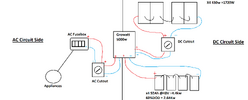abcdescott
New Member
Hi Everyone,
Looking for some help. I have this setup below Yes I have too little batter but hoping to get some more later on.
However I am looking for your oppinion and looking for some help, trying to find out what braker I should be using, the rating etc ?
I have tried to attach my solar write up hopefuly this will make sence. Feel free to ask any questions.
The reason I am using AMG batteries is I got them from work for free... Saving up to get Lifepo4 ones.
Looking for some help. I have this setup below Yes I have too little batter but hoping to get some more later on.
However I am looking for your oppinion and looking for some help, trying to find out what braker I should be using, the rating etc ?
I have tried to attach my solar write up hopefuly this will make sence. Feel free to ask any questions.
The reason I am using AMG batteries is I got them from work for free... Saving up to get Lifepo4 ones.








